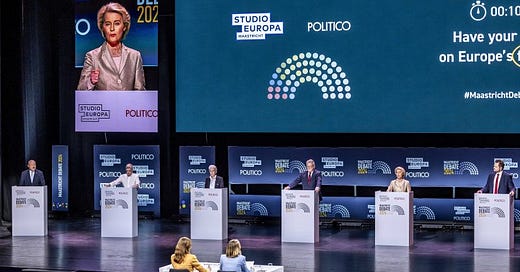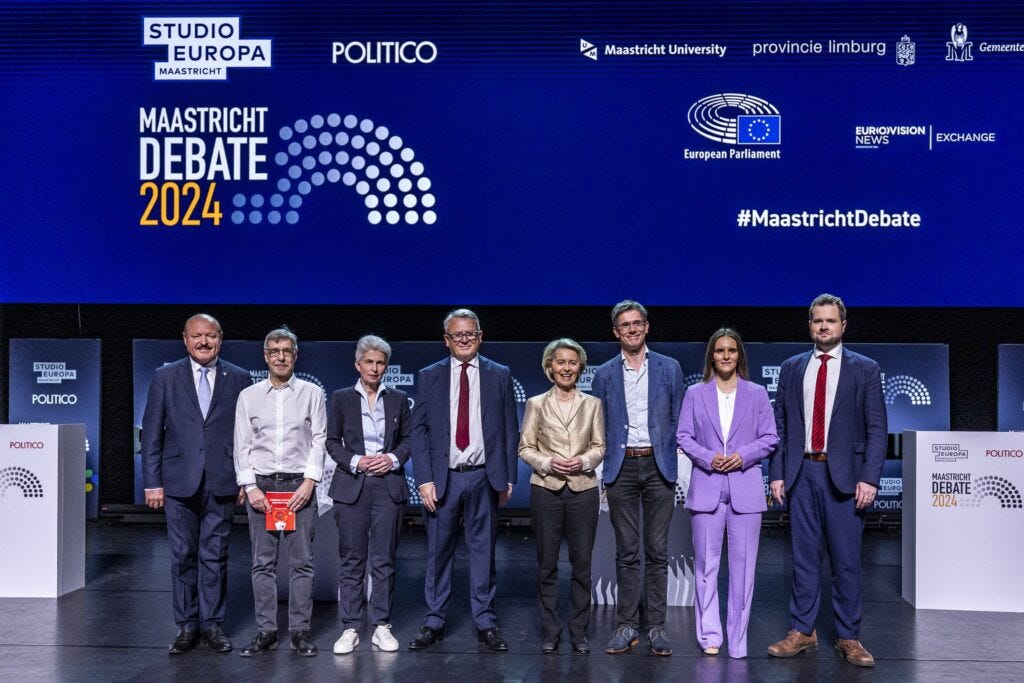The Spitzenkandidaten Debate's Biggest Looser Was Not on Stage
Let's have a look at the Maastricht debate, and why European people don't have a say in the European elections.
Yersterday morning, I ran a quick poll to my colleagues. Did you watch the spitzenkandidaten debate of yesterday?
An unsurpising but resounding “no” capped the poll. This confirmed my suspicion that this Monday’s debate was for naught.
Sure, it was great fun to see Bas Eickhout aim at Ursula von der Leyen, who dealt in slogans and catchphrases, while Anders Vistisen criticised about everything and everyone. But who was this debate for?
Was it supposed to inform the European citizens? That’s assuming they’d be watching. I didn’t look at the figures, but apart from very specialised EU Affairs professionals and EU hardcore nerds (myself included), few citizens sat on their couch to listen Eurocrats present their visions for Europe.
Was it even to convince voters? At the start of the debate, a journalist in Maastricht asked local students if the debate could help them decide which party to support in the upcoming elections. The three students replied that they already had strong ideas, and that yesterday’s exchange had little chance to make them change their minds. And that’s probably true for the rest of us.
What it to present the possible future President of the Commission, then? Only the European Parliament believes in the fable of the Spitzenkandidat. After 2019, nobody can know for sure if the “winner” of the elections will make it to the top job. Even Ursula von der Leyen, the most likely successor to herself, will need to secure the head of states’ and government's approval before retaking the coveted seat.
No — The real reason for this debate was hubris.
Hubris of European parliamentarians promoting the stillborn system of the lead candidates.
Hubris of the Spitzenkandidaten themselves, putting on a show of who will score the most points.
Hubris of the news channels, wanting to present themselves as the organiser of the debate of the elections.
Hubris of the informed viewer: “I watched this debate — see how informed I am.”
But the victim is always the same: the European voters.
Ah! If Europeans could vote…
The French will vote. The Germans will vote. The Dutch will vote. The Belgian are obliged to vote. The Italians, Slovenes, Spaniards… all of them will vote.
But the Europeans?
The European voter still does not exist. And it won’t exist until he or she can elect from a transnational list.
With such a list, the European elector can decide who the next President of the Commission will be. With a transnational list, the European elector could need such a debate.
Did you watch the debate?
Thanks for reading!
I’m Alexandre Météreau, EU lobbyists and campaigner.
The Beubble is a side project where I share insights and practical advice on EU policymaking and influence.
Connect with me on LinkedIn or subscribe to The Beubble for more content and updates. You can also support the newsletter by selecting a premium plan.






